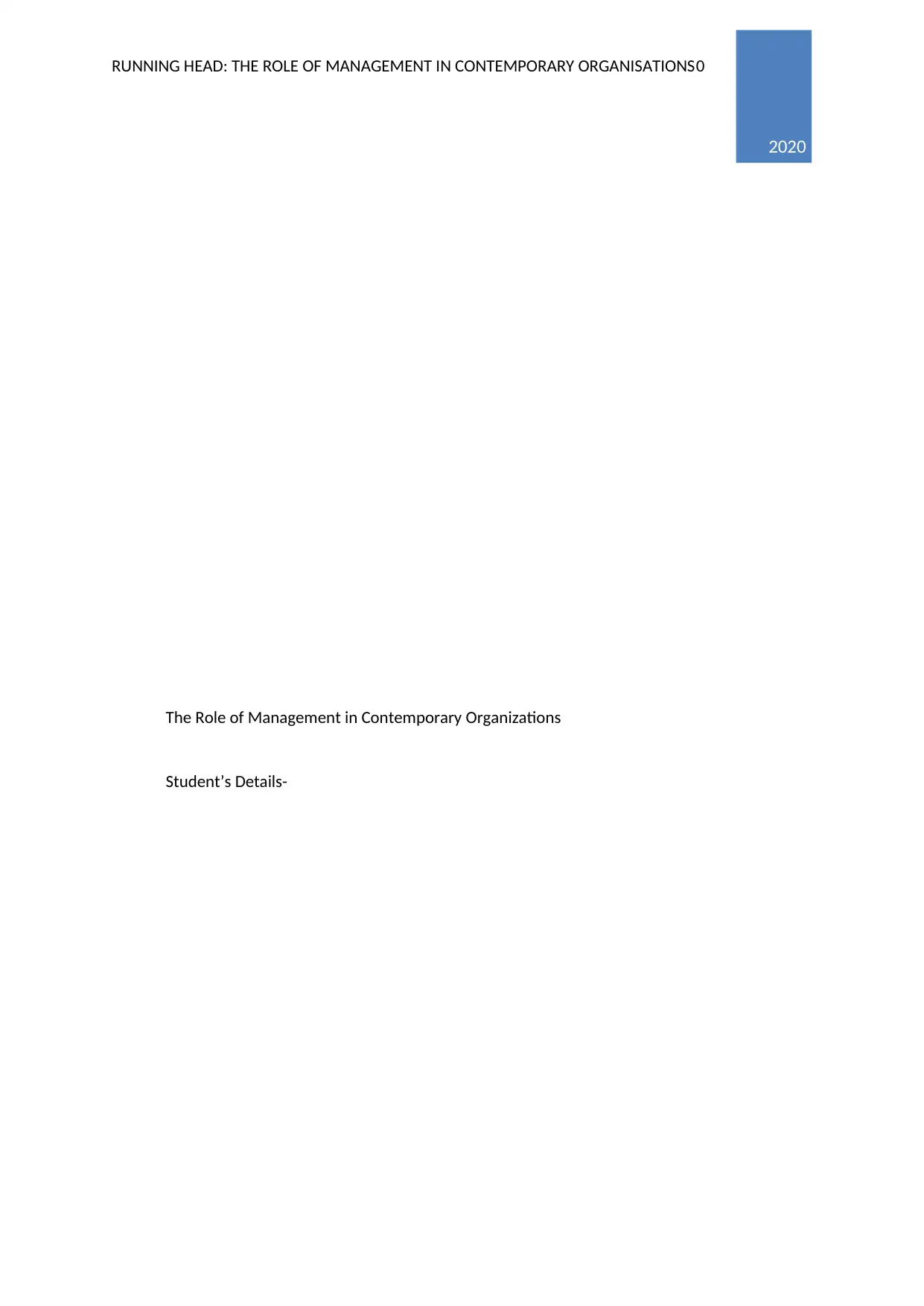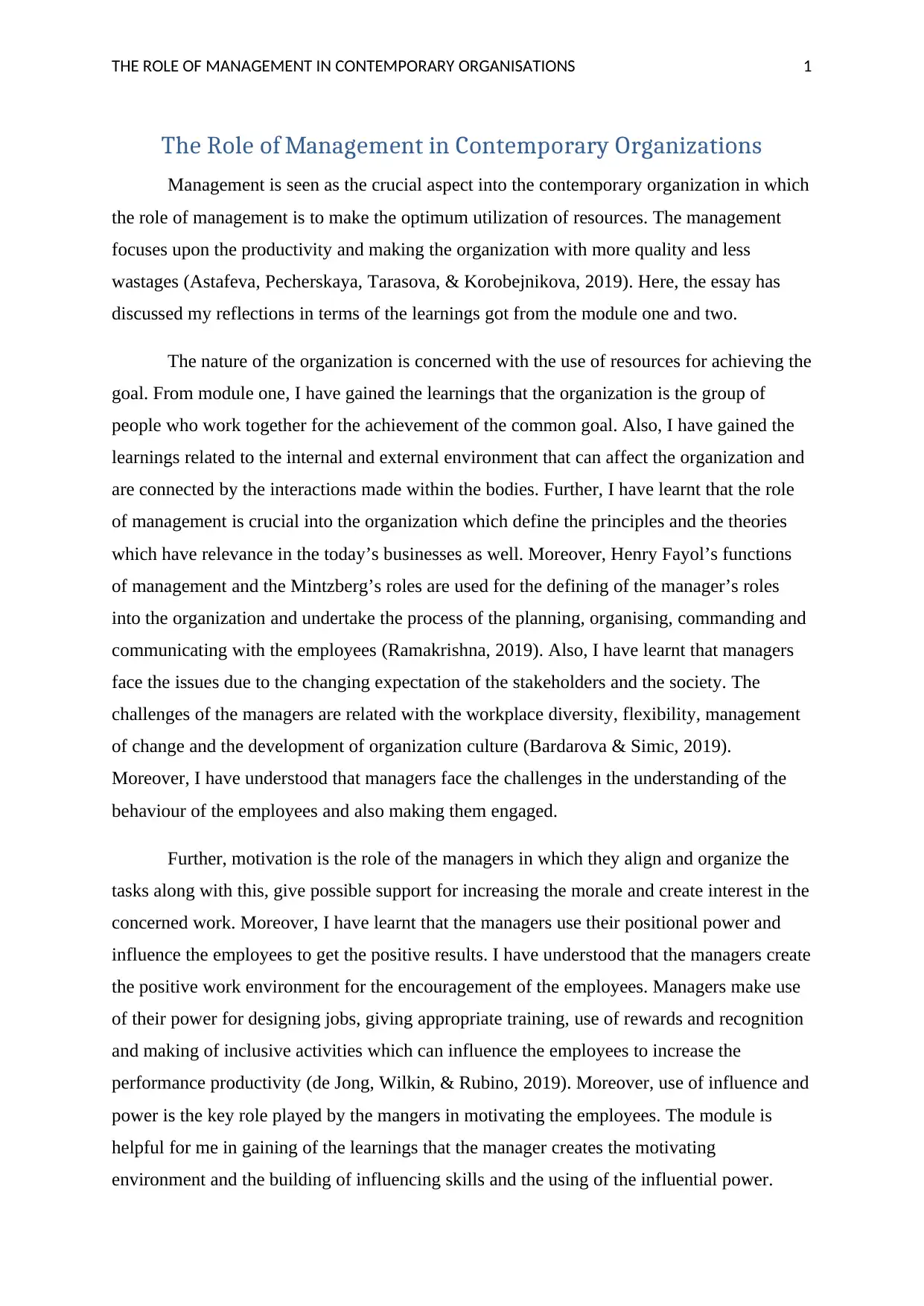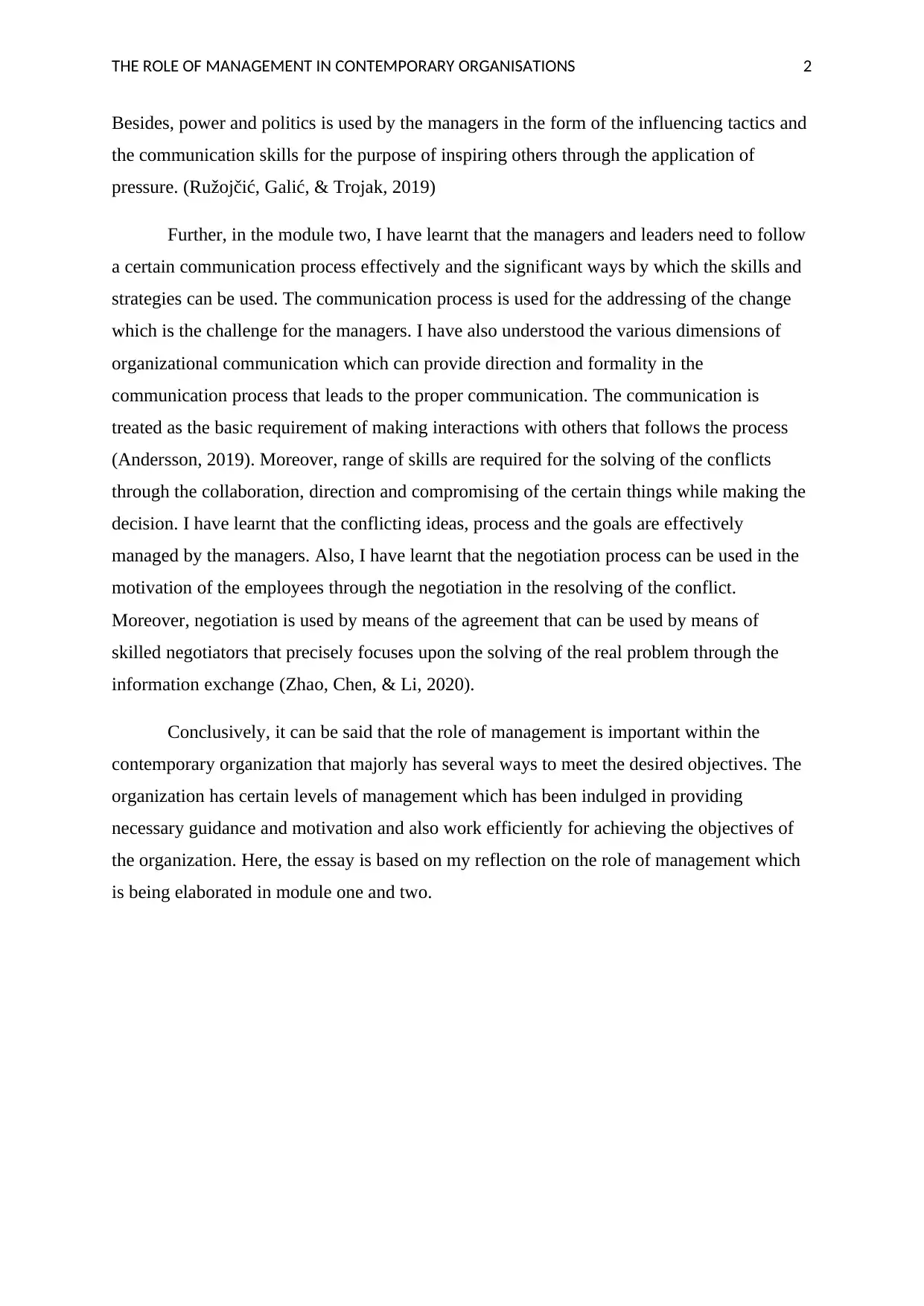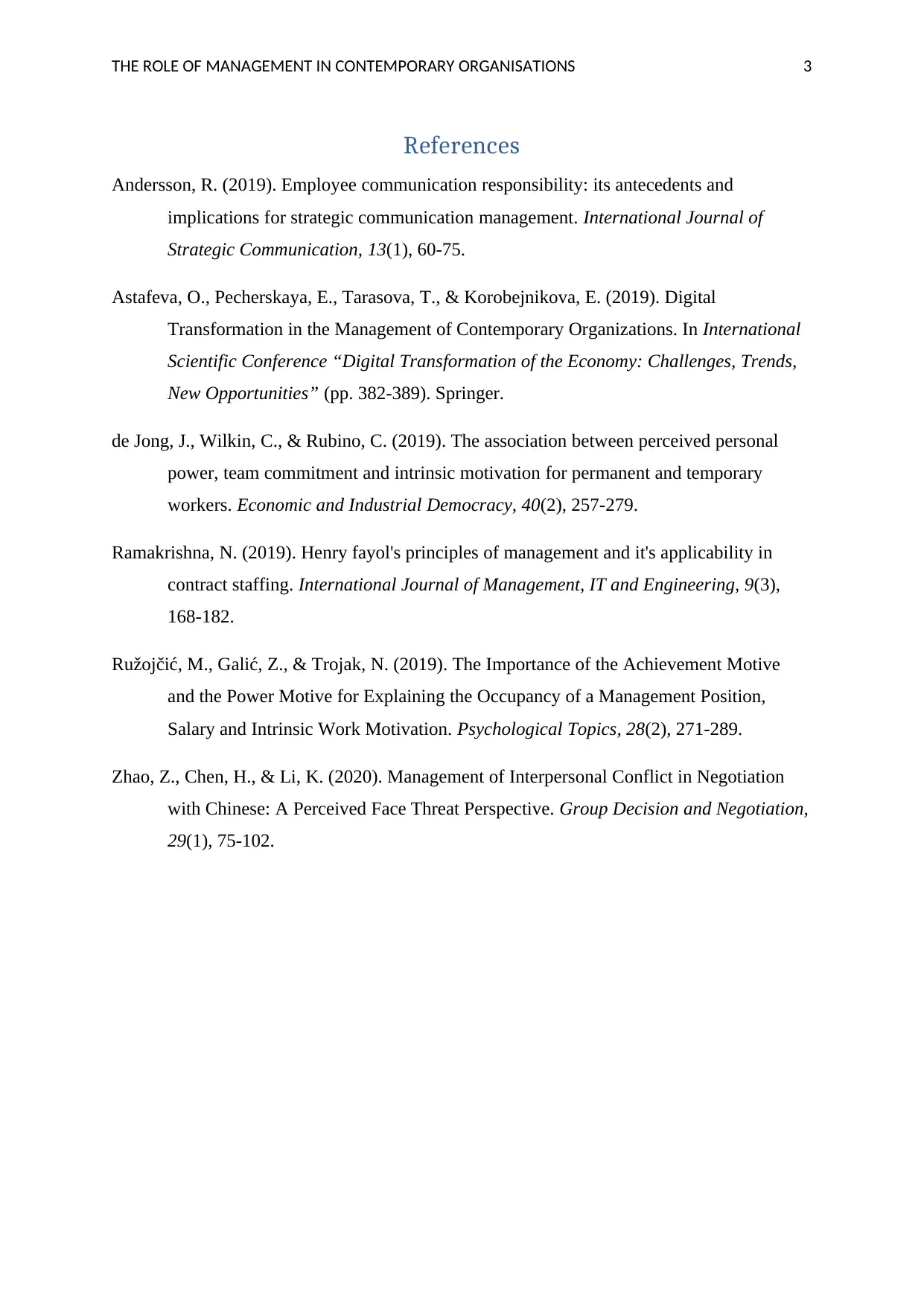Reflective Analysis: The Role of Management in MGT600
VerifiedAdded on 2022/08/17
|4
|1154
|19
Report
AI Summary
This report provides a reflective analysis of the role of management in contemporary organizations, drawing on concepts from MGT600, including the importance of resource utilization, organizational behavior, and the functions of management. The report reflects on learnings from modules one and two, covering topics such as internal and external environments, the significance of Henry Fayol's principles and Mintzberg's roles, and the challenges managers face, including workplace diversity, employee engagement, and motivation. It explores communication processes, conflict resolution, and negotiation strategies, highlighting the need for effective leadership and the use of power and influence to create a positive work environment. The essay concludes by emphasizing the crucial role of management in guiding organizations toward their objectives.

RUNNING HEAD: THE ROLE OF MANAGEMENT IN CONTEMPORARY ORGANISATIONS0
2020
The Role of Management in Contemporary Organizations
Student’s Details-
2020
The Role of Management in Contemporary Organizations
Student’s Details-
Paraphrase This Document
Need a fresh take? Get an instant paraphrase of this document with our AI Paraphraser

THE ROLE OF MANAGEMENT IN CONTEMPORARY ORGANISATIONS 1
The Role of Management in Contemporary Organizations
Management is seen as the crucial aspect into the contemporary organization in which
the role of management is to make the optimum utilization of resources. The management
focuses upon the productivity and making the organization with more quality and less
wastages (Astafeva, Pecherskaya, Tarasova, & Korobejnikova, 2019). Here, the essay has
discussed my reflections in terms of the learnings got from the module one and two.
The nature of the organization is concerned with the use of resources for achieving the
goal. From module one, I have gained the learnings that the organization is the group of
people who work together for the achievement of the common goal. Also, I have gained the
learnings related to the internal and external environment that can affect the organization and
are connected by the interactions made within the bodies. Further, I have learnt that the role
of management is crucial into the organization which define the principles and the theories
which have relevance in the today’s businesses as well. Moreover, Henry Fayol’s functions
of management and the Mintzberg’s roles are used for the defining of the manager’s roles
into the organization and undertake the process of the planning, organising, commanding and
communicating with the employees (Ramakrishna, 2019). Also, I have learnt that managers
face the issues due to the changing expectation of the stakeholders and the society. The
challenges of the managers are related with the workplace diversity, flexibility, management
of change and the development of organization culture (Bardarova & Simic, 2019).
Moreover, I have understood that managers face the challenges in the understanding of the
behaviour of the employees and also making them engaged.
Further, motivation is the role of the managers in which they align and organize the
tasks along with this, give possible support for increasing the morale and create interest in the
concerned work. Moreover, I have learnt that the managers use their positional power and
influence the employees to get the positive results. I have understood that the managers create
the positive work environment for the encouragement of the employees. Managers make use
of their power for designing jobs, giving appropriate training, use of rewards and recognition
and making of inclusive activities which can influence the employees to increase the
performance productivity (de Jong, Wilkin, & Rubino, 2019). Moreover, use of influence and
power is the key role played by the mangers in motivating the employees. The module is
helpful for me in gaining of the learnings that the manager creates the motivating
environment and the building of influencing skills and the using of the influential power.
The Role of Management in Contemporary Organizations
Management is seen as the crucial aspect into the contemporary organization in which
the role of management is to make the optimum utilization of resources. The management
focuses upon the productivity and making the organization with more quality and less
wastages (Astafeva, Pecherskaya, Tarasova, & Korobejnikova, 2019). Here, the essay has
discussed my reflections in terms of the learnings got from the module one and two.
The nature of the organization is concerned with the use of resources for achieving the
goal. From module one, I have gained the learnings that the organization is the group of
people who work together for the achievement of the common goal. Also, I have gained the
learnings related to the internal and external environment that can affect the organization and
are connected by the interactions made within the bodies. Further, I have learnt that the role
of management is crucial into the organization which define the principles and the theories
which have relevance in the today’s businesses as well. Moreover, Henry Fayol’s functions
of management and the Mintzberg’s roles are used for the defining of the manager’s roles
into the organization and undertake the process of the planning, organising, commanding and
communicating with the employees (Ramakrishna, 2019). Also, I have learnt that managers
face the issues due to the changing expectation of the stakeholders and the society. The
challenges of the managers are related with the workplace diversity, flexibility, management
of change and the development of organization culture (Bardarova & Simic, 2019).
Moreover, I have understood that managers face the challenges in the understanding of the
behaviour of the employees and also making them engaged.
Further, motivation is the role of the managers in which they align and organize the
tasks along with this, give possible support for increasing the morale and create interest in the
concerned work. Moreover, I have learnt that the managers use their positional power and
influence the employees to get the positive results. I have understood that the managers create
the positive work environment for the encouragement of the employees. Managers make use
of their power for designing jobs, giving appropriate training, use of rewards and recognition
and making of inclusive activities which can influence the employees to increase the
performance productivity (de Jong, Wilkin, & Rubino, 2019). Moreover, use of influence and
power is the key role played by the mangers in motivating the employees. The module is
helpful for me in gaining of the learnings that the manager creates the motivating
environment and the building of influencing skills and the using of the influential power.

THE ROLE OF MANAGEMENT IN CONTEMPORARY ORGANISATIONS 2
Besides, power and politics is used by the managers in the form of the influencing tactics and
the communication skills for the purpose of inspiring others through the application of
pressure. (Ružojčić, Galić, & Trojak, 2019)
Further, in the module two, I have learnt that the managers and leaders need to follow
a certain communication process effectively and the significant ways by which the skills and
strategies can be used. The communication process is used for the addressing of the change
which is the challenge for the managers. I have also understood the various dimensions of
organizational communication which can provide direction and formality in the
communication process that leads to the proper communication. The communication is
treated as the basic requirement of making interactions with others that follows the process
(Andersson, 2019). Moreover, range of skills are required for the solving of the conflicts
through the collaboration, direction and compromising of the certain things while making the
decision. I have learnt that the conflicting ideas, process and the goals are effectively
managed by the managers. Also, I have learnt that the negotiation process can be used in the
motivation of the employees through the negotiation in the resolving of the conflict.
Moreover, negotiation is used by means of the agreement that can be used by means of
skilled negotiators that precisely focuses upon the solving of the real problem through the
information exchange (Zhao, Chen, & Li, 2020).
Conclusively, it can be said that the role of management is important within the
contemporary organization that majorly has several ways to meet the desired objectives. The
organization has certain levels of management which has been indulged in providing
necessary guidance and motivation and also work efficiently for achieving the objectives of
the organization. Here, the essay is based on my reflection on the role of management which
is being elaborated in module one and two.
Besides, power and politics is used by the managers in the form of the influencing tactics and
the communication skills for the purpose of inspiring others through the application of
pressure. (Ružojčić, Galić, & Trojak, 2019)
Further, in the module two, I have learnt that the managers and leaders need to follow
a certain communication process effectively and the significant ways by which the skills and
strategies can be used. The communication process is used for the addressing of the change
which is the challenge for the managers. I have also understood the various dimensions of
organizational communication which can provide direction and formality in the
communication process that leads to the proper communication. The communication is
treated as the basic requirement of making interactions with others that follows the process
(Andersson, 2019). Moreover, range of skills are required for the solving of the conflicts
through the collaboration, direction and compromising of the certain things while making the
decision. I have learnt that the conflicting ideas, process and the goals are effectively
managed by the managers. Also, I have learnt that the negotiation process can be used in the
motivation of the employees through the negotiation in the resolving of the conflict.
Moreover, negotiation is used by means of the agreement that can be used by means of
skilled negotiators that precisely focuses upon the solving of the real problem through the
information exchange (Zhao, Chen, & Li, 2020).
Conclusively, it can be said that the role of management is important within the
contemporary organization that majorly has several ways to meet the desired objectives. The
organization has certain levels of management which has been indulged in providing
necessary guidance and motivation and also work efficiently for achieving the objectives of
the organization. Here, the essay is based on my reflection on the role of management which
is being elaborated in module one and two.
⊘ This is a preview!⊘
Do you want full access?
Subscribe today to unlock all pages.

Trusted by 1+ million students worldwide

THE ROLE OF MANAGEMENT IN CONTEMPORARY ORGANISATIONS 3
References
Andersson, R. (2019). Employee communication responsibility: its antecedents and
implications for strategic communication management. International Journal of
Strategic Communication, 13(1), 60-75.
Astafeva, O., Pecherskaya, E., Tarasova, T., & Korobejnikova, E. (2019). Digital
Transformation in the Management of Contemporary Organizations. In International
Scientific Conference “Digital Transformation of the Economy: Challenges, Trends,
New Opportunities” (pp. 382-389). Springer.
de Jong, J., Wilkin, C., & Rubino, C. (2019). The association between perceived personal
power, team commitment and intrinsic motivation for permanent and temporary
workers. Economic and Industrial Democracy, 40(2), 257-279.
Ramakrishna, N. (2019). Henry fayol's principles of management and it's applicability in
contract staffing. International Journal of Management, IT and Engineering, 9(3),
168-182.
Ružojčić, M., Galić, Z., & Trojak, N. (2019). The Importance of the Achievement Motive
and the Power Motive for Explaining the Occupancy of a Management Position,
Salary and Intrinsic Work Motivation. Psychological Topics, 28(2), 271-289.
Zhao, Z., Chen, H., & Li, K. (2020). Management of Interpersonal Conflict in Negotiation
with Chinese: A Perceived Face Threat Perspective. Group Decision and Negotiation,
29(1), 75-102.
References
Andersson, R. (2019). Employee communication responsibility: its antecedents and
implications for strategic communication management. International Journal of
Strategic Communication, 13(1), 60-75.
Astafeva, O., Pecherskaya, E., Tarasova, T., & Korobejnikova, E. (2019). Digital
Transformation in the Management of Contemporary Organizations. In International
Scientific Conference “Digital Transformation of the Economy: Challenges, Trends,
New Opportunities” (pp. 382-389). Springer.
de Jong, J., Wilkin, C., & Rubino, C. (2019). The association between perceived personal
power, team commitment and intrinsic motivation for permanent and temporary
workers. Economic and Industrial Democracy, 40(2), 257-279.
Ramakrishna, N. (2019). Henry fayol's principles of management and it's applicability in
contract staffing. International Journal of Management, IT and Engineering, 9(3),
168-182.
Ružojčić, M., Galić, Z., & Trojak, N. (2019). The Importance of the Achievement Motive
and the Power Motive for Explaining the Occupancy of a Management Position,
Salary and Intrinsic Work Motivation. Psychological Topics, 28(2), 271-289.
Zhao, Z., Chen, H., & Li, K. (2020). Management of Interpersonal Conflict in Negotiation
with Chinese: A Perceived Face Threat Perspective. Group Decision and Negotiation,
29(1), 75-102.
1 out of 4
Related Documents
Your All-in-One AI-Powered Toolkit for Academic Success.
+13062052269
info@desklib.com
Available 24*7 on WhatsApp / Email
![[object Object]](/_next/static/media/star-bottom.7253800d.svg)
Unlock your academic potential
Copyright © 2020–2026 A2Z Services. All Rights Reserved. Developed and managed by ZUCOL.





